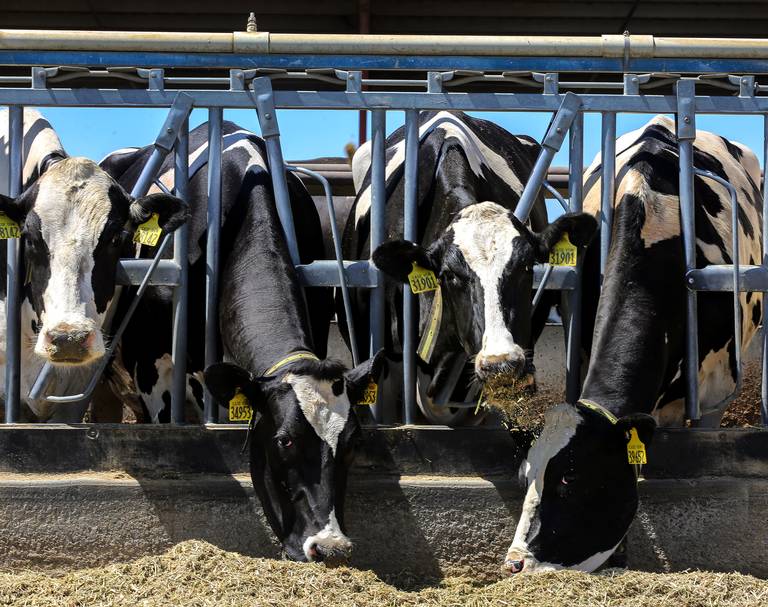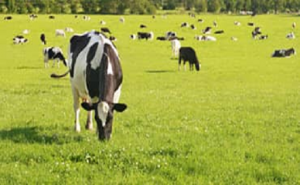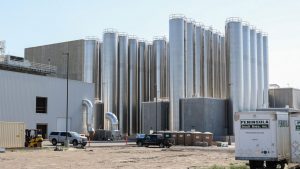
But industry leaders say the payments fell well short of the losses farmers suffered as the Trump Administration negotiates new relationships with a mix of tariffs and talk.
“The mitigation payments did not even come close to remediating the large losses our dairy farmers took because of the trade battles in 2018 and that are still going on with China,” said Jay Gordon, policy director for the Washington State Dairy Federation.
A searchable database of farm aid payments obtained by the Associated Press shows the U.S. Department of Agriculture paid $50.7 million to 7,538 Washington farmers for 2018 damages. That’s an average of about $6,700 each.
Washington is home to nearly 36,000 farms, according to the most recent USDA Census of Agriculture.
That means about one in five farms received aid dollars in amounts ranging from $2 to $174,450.
Nearly half of all Washington aid went to cherry growers, followed by wheat, dairy and corn.
TRADE, NOT MITIGATION
Farmers are hopeful mitigation payments will be temporary and not permanent subsidies that skew farm operations.
“By and large, farmers are not interested in handouts,” said Pam Lewison, agriculture director for the Washington Policy Center. “They are interested in selling their product.”
Lewison said farmers should view mitigation payments as insurance to help them survive trade wars beyond their control.
“Everyone in farm country is holding their breath, trying to figure out how to get by and plant another year,” she said.
Case VanderMeulen, who operates Coulee Flats Dairy in Mesa, received $125,000 in mitigation payments to offset low milk prices in 2018.
“Every little bit helps,” said VanderMeulen.
Coulee Flats sends milk from 7,000 cows to the 500-member Darigold cooperative for processing into consumer products such as milk, cheese and yogurt.
The money helped offset a year of low prices. But it’s a poor substitute for a robust, tariff-free market for dairy products.
“Nothing can mitigate for free trade,” VanderMeulen said. “We don’t like farming the government.”
CHERRIES, WHEAT, DAIRY AND CORN
The government paid 754 Washington cherry growers a combined $24.5 million.
Farmers received as little as $12 and as much as $144,000.
The impact from disrupted trade went far higher, according to the Northwest Horticultural Council.
The trade group estimates Washington cherry growers lost $60 million to $86 million in 2018 to lost exports to China.
Mitigation payments don’t cover the full cost, but growers are grateful for the help,
“(T)he payments are welcome and appreciated to help offset some of these losses,” said Kate Tynan, senior vice president for the horticultural council.
The 266 dairy farmers split $5.5 million, with payments ranging from $584 to $125,000.
The 6,389 wheat growers split $20.5 million. Their payouts ranged from $4 to $174,450.
In the Mid-Columbia, 367 farms split $5.7 million in mitigation payments, with cherry growers receiving 75 percent.
BENTON AND FRANKLIN COUNTY FARMS
Only 16 percent of the nearly 2,300 farms in Benton and Franklin counties received aid payments.
Participating Benton County cherry growers received an average of $38,300. Their Franklin County counterparts received an average of $34,600.
Local wheat growers received a combined $926,000, with 79 Benton growers receiving an average of $5,000 and 141 Franklin growers receiving an average of $3,700.
Ten dairy farmers in Franklin County split nearly $400,000, with an average payout of $39,800.
Compensation depended on a range of factors, including plantings and an assessment of damages.
TRADE WARS FELT
The payouts offer financial support to farmers facing broad declines in exports.
China and other partners imposed retaliatory tariffs on key U.S. exports after the Trump administration raised tariffs on steel, aluminum, intellectual property and other imports to redraw trade relationships with its longtime allies.
China, Mexico and India targeted a range of agricultural products, including many grown in Washington. The tariffs pushed costs up 50 percent and impacted exports.
Milk exports to China fell by a reported 43 percent, according to USDA figures.
The standoff is felt keenly by Washington’s $10.6 billion agriculture industry.
The state exports more than 300 agricultural and food-related products, making it the most trade-dependent state in the nation.
The Washington State Department of Agriculture estimated $650 million worth of crops were at risk in 2018 — $480 million to China and $166 million to Mexico.
The aid payments were conceived to offset the damage. The USDA began releasing funds from the $12 billion farm aid package late last year and early this year.
With trade still disrupted, the USDA will distribute an additional $16 billion to support agriculture in 2019. Secretary Sonny Perdue announced the program last week.
Producers can sign up at their local Farm Services Agency through Dec. 6.
RELIEF IN SIGHT?
Farmers are hopeful a trade agreement negotiated with Canada and Mexico last fall will be ratified and drop tariffs to zero.
The United States-Mexico-Canada Agreement, dubbed the “new” NAFTA, will provide for tariff free trade in North America once it’s ratified.
It has been ratified in Mexico and introduced in Canada.
However, the U.S. Congress failed to vote on the deal prior to the August recess, triggering protests from local wheat farmers who say trade wars are threatening the industry.
In a joint statement Wednesday, the Washington Grain Commission and the Washington Association of Wheat Growers called on Congress to schedule an expedited vote.
“Lack of action on the USMCA treaty will force the industry to consume more of the equity in their operations in order to stay afloat,” Glen Squires, the grain commission’s CEO, said in a news release.
Last week, U.S. Rep. Dan Newhouse, R-Sunnyside, joined farmers at a Pasco rally to urge Congress to ratify the agreement, saying Republicans stand ready to sign off.
He called it critical to normalize trade with the Washington’s first and fifth most important ag customers — Canada and Mexico.
USMCA supporters say the U.S. can build on the momentum to improve relationships with China and the Asia-Pacific nations that formed the Trans-Pacific Partnership.
President Trump fulfilled a campaign promise to pull the U.S. out of the agreement.

























